● Logan Kilpatrick recently announced that Google DeepMind is making Retrieval-Augmented Generation (RAG) accessible to everyone by adding a fully managed File Search Tool right into the Gemini API. Now live in Google AI Studio, this update is a game-changer for developers building search tools, AI assistants, and knowledge-based apps.
● The idea is straightforward: get rid of the technical and financial headaches that have always made RAG tough and pricey to set up. As Logan Kilpatrick explained, the new system "handles storage, chunking, embedding, and retrieval automatically," so you don't need vector databases, custom pipelines, or specialized infrastructure anymore. This makes life easier for teams dealing with traditional RAG setups—no more engineering bottlenecks, system crashes, or hunting for specialized talent to keep everything running.
● The cost savings are just as impressive. Traditional RAG setups can get expensive fast with vector storage fees, constant embedding updates, and heavy compute demands. Google DeepMind flips the model completely. Now developers only pay for the initial embedding generation—just $0.15 per million tokens—while storage and query-time embeddings are completely free. It's a smart move that matches the industry's shift toward leaner, more efficient solutions instead of expensive custom systems.
Doing RAG has historically been a pain… the question we asked ourselves was how to make it painless and cheaper. As Kilpatrick put it
● The tool's capabilities make it even more attractive. The File Search Tool works with PDFs, DOCX, TXT, JSON, and various code formats, and automatically creates citations showing which document pieces the model used. Early users like Phaser Studio's Beam are seeing huge improvements—tasks that used to take hours now finish "in seconds." Running on Gemini's advanced embedding model, this update marks a real jump forward in developer productivity and RAG accessibility.
 Saad Ullah
Saad Ullah

 Saad Ullah
Saad Ullah


